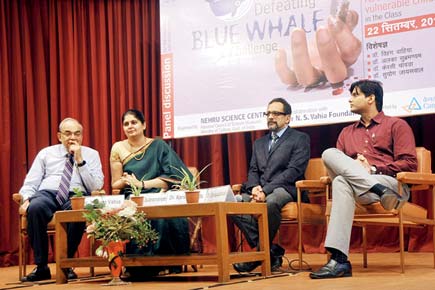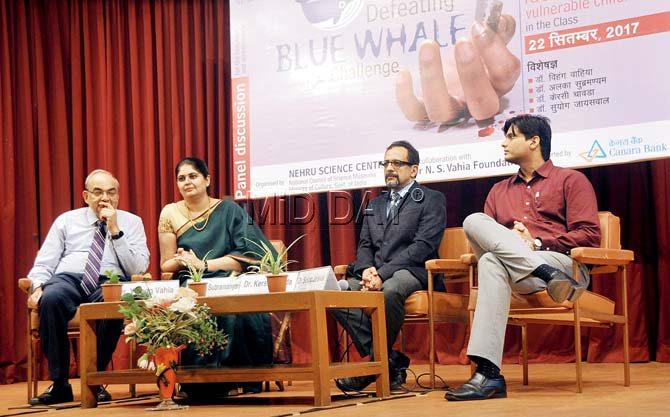City's science centre hosts experts who debate red flags and response to the deadly Blue Whale Challenge


Experts talk on the dangers of the Blue Whale Challenge at Nehru Science Centre in Worli on Friday. Pic/Sayed Sameer Abedi
The Blue Whale swam to the shores of the salubrious Nehru Science Centre in Mahalaxmi yesterday. The Centre, dedicated to the development of a scientific temper, held a session in the afternoon - Understanding the Blue Whale Game - with focus on identifying vulnerable children at risk of deliberate self-harm.
ADVERTISEMENT
The Challenge is a suicide game, preying on youngsters. The modus operandi is to give a player 50 tasks over 50 days with the intensity of self-harm increasing with each task, the final one demanding that the player, or 'whale' as s/he is called, commit suicide.
A panel of experts - Dr Vihang Vahia, Dr Kersi Chavda, Dr Alka Subramanyam and Dr Suhyog Jaiswal - held an interactive session with the audience, comprising teachers, mental health experts, counsellors and parents.
Ears open for warning bells
Nehru Science Centre director Dr S Khened, in his introduction, said, "The digital divide between the haves and the have nots has closed. Today, our children, at the click of a button, have access to the same programmes, apps and information that others have in developed countries."
The first speaker, Dr Vahia, asked the audience if the Blue Whale game was a cult. Vahia said one of the big draws of the game, which he was discussing with a colleague in England, "was that the tasks emphasised the dynamics of revenge and punishment. These are appealing to that age group."
Vahia added that the best approach was to give them attention. "Listen to your kids and don't be judgemental. Build mutual trust and bonding. Teach the child that life is more than a game; the family needs to fill his/her life with love and affection."
Teachers spoke about the importance of hearing a warning bell if a student asks his parents questions like: 'if I am not there tomorrow, will you miss me?'
Virtual validation
Experts concurred that for many kids there was a need to seek validation not just in the real but also the virtual world. Counsellor V Sanghi outlined some salient points about vulnerable children. "These may be risk-takers, they may face bullying, harassment and abuse, online and offline," she explained, illustrating once again how youngsters inhabit the two worlds - virtual and real - in this day and age.
Dr Chavda said, "What we are looking at is the larger picture of suicides in youngsters, and Blue Whale is a catalyst."
Rupa Katiyar, principal of a Colaba school, spoke about some of these children being attention seekers. "It is important that we ensure confidentiality as teachers, treating what we talk to the child in absolute confidence," she said.
Friends in need
Psychologist R Shah said, "It may be good to have a buddy to watch out for a child who, we suspect, may be vulnerable. This friend can be subtle when s/he monitors him/her."
"Kids can be shown celebrities who had failed at some point in their lives, to show that it's alright to have a failure," Shah added.
"Kids are burdened with the expectation that they should be happy; let us not burden them with this, as if it's a measure of success."
Some key takeaways from the stimulating two-hour session were that the Blue Whale was the focus, but the broader ambit was to look at youngsters indulging in self-harm and suicides overall. The panelists agreed it was vital to give time to children and communicate with them. Next came the necessity of teaching them the importance of resilience, that they should learn how to take rejection.
Even as the experts summed up a session that threw up so many anecdotes, examples and viewpoints, Dr Vahia reminded his audience: "To have the snacks before we leave," filling the hall with laughter, and proving that, just like real and virtual worlds, here too there was food to eat, after the food for thought."
 Subscribe today by clicking the link and stay updated with the latest news!" Click here!
Subscribe today by clicking the link and stay updated with the latest news!" Click here!







